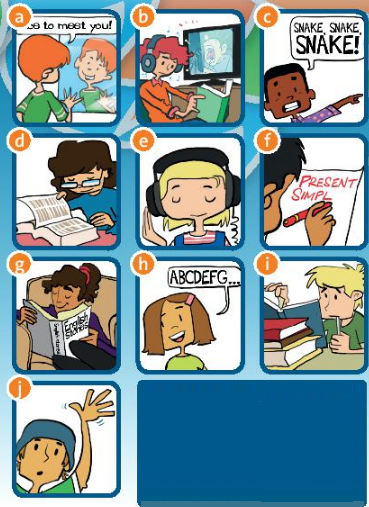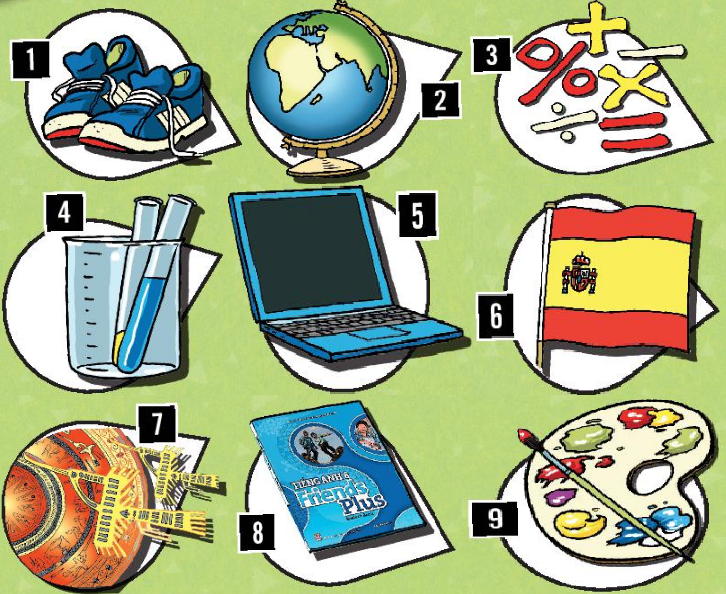Hãy nhập câu hỏi của bạn vào đây, nếu là tài khoản VIP, bạn sẽ được ưu tiên trả lời.

Tạm dịch:
Bạn có phải là học sinh SIÊU ngôn ngữ?
Trả lời các câu hỏi. Ghi 1 điểm cho mỗi câu trả lời CÓ. Sau đó nhìn vào đáp án.
1. Bạn có bao giờ nghe tiếng Anh khi bạn không ở trường?
2. Bạn có biết bảng chữ cái? Bạn có thể đánh vần tên của bạn bằng tiếng Anh không?
3. Bạn có kiểm tra các từ trong từ điển hoặc danh sách từ không?
4. Bạn có lặp lại một từ mới nếu bạn muốn học nó không?
5. Bạn có bao giờ luyện phát âm không?
6. Bạn có ôn tập trước khi thi không?
7. Bạn có đặt câu hỏi khi bạn không hiểu?
8. Bạn có thường tập trung khi làm bài tập không?
9. Bạn có ghi chú về ngữ pháp hoặc viết từ vựng mới vào sổ tay không?
10. Bạn có bao giờ đọc sách, bài báo hoặc truyện tranh bằng tiếng Anh không?

Choose A-F to complete the following conversation between a sister (Mary) and her younger brother (Tim). There’s one extra letter.
|
Mary: Tim, you are always forgetting to turn off the light when you go out of the room. Tim: (1) ____E______. Mary: If you forget all the time, we’ll have to pay a lot of money for electricity. Tim: (2) ___A___. Mary: By the way, I think we need to grow some flowers in our garden. Peter: (3) ____F______. Mary: And we can grow some vegetables too. Tim: (4) ___D____. Mary: Now go and tell mum and dad about our ideas. Do you know where they are? Tim: (5) __B_____. |
A. I see. I’ll remember next time. B. They are in the living room. C. What about planting some flowers in the city? D. Yes. If we grow flowers and vegetables, our house will be greener and more beautiful. E. I’m sorry. F. It’s a great idea. We can grow flowers in the front garden. |

Read the passage and do the following tasks.
Zoo Guide
Good morning and welcome to our zoo! We have lots of different animals for you to see,I'll just tell you about some of them.
We have six elephants,four lions,six tigers, two leopards and pair of hoppos.
If you want to see snakes,then we have eighteen types of snakes.
The insects house is very interesting : there are one hundred diifferent insects.You can see sixteen types of bees!
There's also a part of the zoo for Australian animals.We have got any kangaroos,but we have got a pair of koalas and they have got a baby.
I hope you like our zoo!
Come and visit us again!
| STATEMENTS | TRUE OR FALSE |
| 1.There aren't lots of animals in the zoo. | False |
| 2. You can see hippos at the zoo. | True |
| 3. There are lions and tigers there. | True |
| 4. Bees are not insects. | False |
| 5. You can see a baby koala in the zoo. | True |

STAMPS COLLECTION: At first, people preferred to collect by country. They chose one topic in their own country. Nowadays people enjoy collecting in topics from several countries. The most favorite themes are sports...
BUTTERFLY COLLECTION: Many people enjoy this hobby they have a close contact with outdoors,exercise and nature. They also gain a knowledge of insects
GROWING PLANTs: Today this hobby becomes very popular in the world. For many people it is a form of exercise and an enjoyable leisure activity. With a little soil some seeds and a few basic tools people can enjoy creating a beautiful thing and watching it grow
Stamps collection
at first, people preferred to collect by country. They chose one topic in their own country. Nowadays people enjoy collecting in topics from several countries. The most favorite themes are sports...
butterfly
Many people enjoy this hobby the have a close contact with the outdoors, exercise and nature. They also gain a knowledge of insects today
Growing plants
this hobby becomes very popular in the world. For many people, it is a form of exercise and an enjoyable leisure activity> with a little soil some seeds and a few basic tools people can enjoy creating a beautiful thing and watching it grow

1. Start/ finish the day (Mở đầu/ kết thúc ngày) | 2. Eat (Ăn) | 3. Travel (Đi lại) | 4. Free time (Thời gian rảnh rỗi) | 5. Work and study (Làm việc và học tập) |
- get up (thức dậy) - brush my teeth (đánh răng) - wash my face (rửa mặt) - go to bed (đi ngủ) - sleep (ngủ) | have breakfast / lunch/ dinner (ăn sáng/ trưa/ tối) | - go to school (đi học) - get home (về nhà) | - watch TV (xem tivi) - relax (thư giãn) - play video games (chơi trò chơi trên máy tính) - chat online (trò chuyện trực tuyến) | - study (học tập) - have classes (có lớp học) - do their homework (làm bài tập về nhà) - help with the housework (giúp làm việc nhà) |

1. PE
2. geography
3. maths
4. science
5. ICT
6. Spanish
7. history
8. English
9. art
1. Are you good at PE?
(Bạn có giỏi môn thể dục không?)
2. When’s our next geography exam?
(Khi nào thì kỳ thi Địa lý tiếp theo của chúng ta?)
3. Are you a maths genius?
(Bạn có phải là một thiên tài toán học không?)
4. Is your science notebook organised?
(Sổ ghi chép khoa học của bạn có được sắp xếp không?)
5. Have we got an ICT class tomorrow?
(Ngày mai chúng ta có tiết học Công nghệ thông tin và truyền thông không?)
6. Do you study other languages, like Spanish?
(Bạn có học các ngôn ngữ khác, như tiếng Tây Ban Nha không?)
7. Have you got history homework today?
(Hôm nay bạn có bài tập Lịch sử không?)
8. Do you think that our English textbook is interesting?
(Bạn có nghĩ sách giáo khoa tiếng Anh của chúng ta thú vị không?)
9. How many art teachers are there in the school?
(Có bao nhiêu giáo viên mỹ thuật trong trường?)

Hi there
Imagine, it's almost midnight here, and I don't need a lamp to write this. We are in Reykjavík, the capital of Iceland to visit my father who's teaching at the university here this term. We are staying at a small hotel near the university. If I look out of the window, I can see moutand everywhere - and minute of our trip. Yesterday I saw some geysers and a real volcano eruption. I'll e-mall you some photos when I get back to London.
All the best,
Rob

Chọn các từ trong khung điền vào chỗ trống để hoàn thành đoạn văn sau.
During the reenage years , many young people can at times be difficult to talk to .They often seem to dislike for(1) questioned . They may seem unwilling to talk about their work(2) at school. This is a normal development at this growing(3) . Though it can be very hard for parents to understand, it is part of becoming independent of teenagers trying to be adult while they are still push(4) up. Young people are usually more willing to talk if they believe that questions are asked out of real interest and not because people are trying to check up on them.
Parents should do their best to talk to(5) their son and daughter about school, work and future plans but should not being(6) them to talk if they don't want to. Parents should also watch are(7) danger signs: some young people in trying tobe adult may experiment with drugs, alcohol, or smoking. Parents need to watch for any signs(8) of unusual behaviour, which may be connected with these, and help if necesary.
(1)for
(2)work
(3)growing
(4)push
(5)to
(6)being
(7)are
(8)signs
Mình nghĩ là làm như vậy đó!!



1.hear
2.grow
3.kill
4.drink
5.survive
6.see
7.see
8.fly
9.run
1. Can elephants (1) hear with their ears and their feet?
(Voi có nghe được bằng tai và bằng chân không?)
2. How big can a gorilla (2) grow?
(Một con khỉ đột có thể phát triển lớn đến mức nào?)
3. Some scorpions are dangerous. Can a scorpion (3) kill a human?
(Một số loài bọ cạp rất nguy hiểm. Bọ cạp có thể giết người không?)
4. Camels don't (4) drink a lot of water. How many months can a camel (5) survive without water?
(Lạc đà không uống nhiều nước. Lạc đà có thể sống được bao nhiêu tháng nếu không có nước?)
5. How far can an eagle (6) see? It can (7) see a small animal from a distance of
(Đại bàng có thể nhìn thấy bao xa? Nó có thể nhìn thấy một con vật nhỏ từ khoảng cách…)
6. Ostriches can't (8) fly but how fast can they (9) run?
(Đà điểu không thể bay nhưng chúng chạy nhanh đến mức nào?)